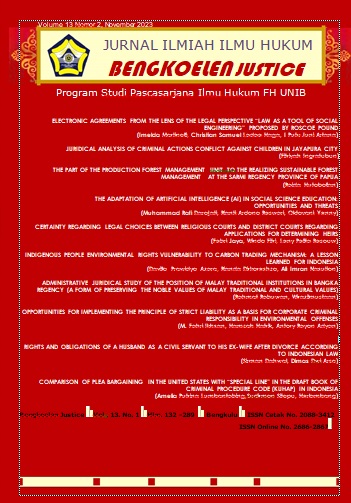Main Article Content
Abstract
AI offers convenience to human life. The trend of using AI-based scientific work has caused polemics for educational institutions because it has the potential to increase cheating, injustice, plagiarism and even reduce analytical skills which have an impact on academic integrity. Meanwhile, the main value in learning in higher education is instilling academic integrity to form ethical principles, values and manners in students. students in a social environment. The research method used is empirical juridical by conducting research on applicable legal provisions and implemented in practice, in this case the research was carried out on the provisions governing Artificial Intelligence (AI) and its application in the world of education. This qualitative research uses secondary data to study the adaptation of AI use in higher education, especially in the social sciences and humanities fields. The development of guidelines and regulations in the implementation of AI can minimize ethical issues in higher education. The results of this research show that the application of AI in the world of education needs to be regulated in a regulation so that its application does not overlap and remains in line with the aim of making education easier.
Keywords: Artificial Intelligence, higher Education, regulation.
Article Details
Copyright (c) 2023 Muhammad Rafi Darajati, Rianti Ardana Reswari, Oktavani Yenny

This work is licensed under a Creative Commons Attribution-ShareAlike 4.0 International License.

Ciptaan disebarluaskan di bawah Lisensi Creative Commons Atribusi-BerbagiSerupa 4.0 Internasional.
